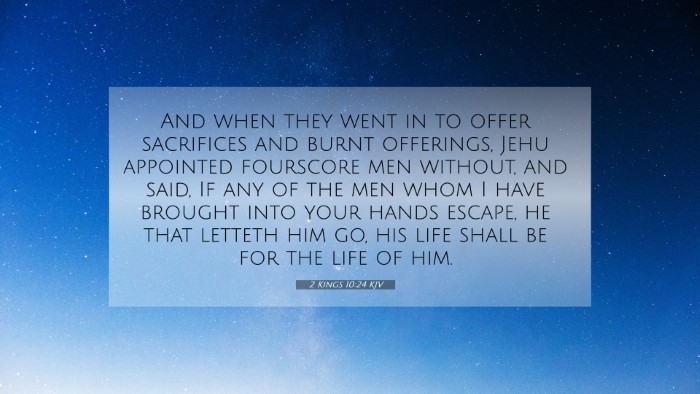Understanding 2 Kings 10:24
The verse 2 Kings 10:24 states:
"So they went in to offer sacrifices and burnt offerings. Now Jehu had stationed for himself eighty men outside, and had said, 'The man who allows any of those whom I give into your hands to escape shall give up his life in exchange for him.'" (NASB)
Summary of the Verse
This verse is critical in understanding the intense political and religious purges that took place during Jehu's reign. After the execution of Jezebel, Jehu was determined to rid Israel of the worshippers of Baal. He cleverly devised a plan to lure the Baal worshippers into a false sense of security to eliminate them.
Key Themes and Insights
- Judgment on Idolatry: Jehu's actions symbolize God's judgment on Israel's idolatry.
- Deception in Warfare: Jehu used deception as a tactic to gain the upper hand over Baal worshippers.
- Fear of Accountability: The verse reflects the seriousness with which Jehu enforced his command, indicating the lethal consequences of disobedience.
- Sacrifice in Worship: The offering of sacrifices demonstrates the religious dimension of Jehu's mission to eradicate Baal worship.
- Leadership and Authority: Jehu exemplifies strong leadership that comes with the responsibility of making difficult decisions.
Commentary Insights
Matthew Henry: Henry emphasizes that Jehu’s strategy reveals both his astuteness in political maneuvers and God's providence in delivering justice against false worship. The actions of Jehu are portrayed as divinely ordained to cleanse Israel.
Albert Barnes: Barnes highlights that Jehu's decisive actions were necessary to establish true worship in Israel. He notes that the purging of idol worship was fundamental for restoring Israel to a right relationship with God.
Adam Clarke: Clarke discusses the importance of the sacrifices being offered and how they may have been perceived as religious acts of fidelity to the gods they worshiped. He encounters the tension between these rituals and Jehu’s hidden murderous intentions.
Bible Cross-References
This verse relates to several other Scriptures that provide a broader context for understanding Jehu's actions:
- 2 Kings 9:6-10 - The anointing of Jehu.
- 2 Kings 10:28 - The destruction of Baal worship.
- 1 Kings 18:40 - The execution of the prophets of Baal by Elijah.
- 2 Chronicles 22:9 - Jehu's pursuit of the remaining house of Ahab.
- Hosea 1:4 - The judgment against the house of Jehu.
- 2 Chronicles 17:6 - Jehoshaphat's reforms against idolatry.
- Revelation 2:14 - A warning against the teachings of Balaam and idolatry.
Applying the Verse Today
The message of 2 Kings 10:24 challenges believers to evaluate their commitment to God and to ensure that they are not participating in anything that leads them away from true worship. It also serves as a reminder of the seriousness of spiritual leadership and accountability.
Thematic Connections
Jehu's story connects to broader biblical themes including:
- The Role of Leadership: Both good and bad leaders in the Bible showcase the impact of their decisions on the spiritual state of their nations.
- Judgment Against Sin: God's consistent pattern of bringing judgment against nations that turn to idolatry.
- Divine Providence: The assurance that God remains in control and will enact justice, even through imperfect vessels.
Conclusion
2 Kings 10:24 serves as a pivotal verse in understanding the dynamics of faith, leadership, and the consequences of idolatry. By cross-referencing related Scriptures, one can gain a comprehensive view of the narrative that highlights the tension between true worship and false gods. This account encourages us to reflect on our own lives, ensuring our devotion to God aligns with His commands.
Further Study Suggestions
For those interested in exploring this theme further, consider using tools for Bible cross-referencing, such as:
- Bible concordances
- Bible cross-reference guides
- Cross-reference Bible study methods
Understanding the connections between Bible verses can enrich your devotional practices and deepen your knowledge of Scripture.



